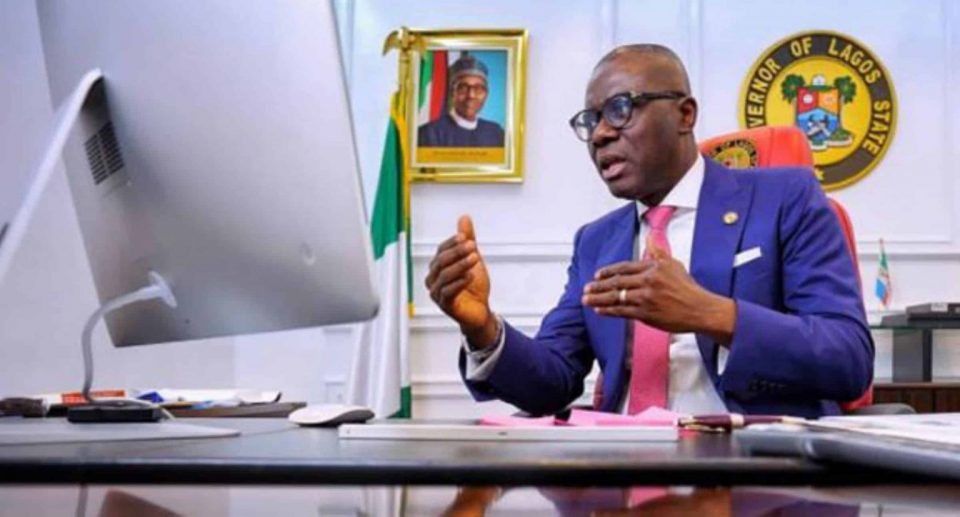Photo caption: Lagos State Governor, Babajide Sanwo-Olu
The Lagos State Government says an increase in boarding fees in its model colleges is inevitable, to ensure better welfare of the students.
This was contained in a statement on Monday by the state’s Ministry of Basic and Secondary Education signed by the Deputy Director, Public Affairs of the Ministry, Mr Ganiu Lawal.
Lawal noted that students in the boarding schools were over one per cent of the entire basic and secondary school student population in public schools in the state.
According to Lawal, the N35,000 boarding fee being paid since 2021 is unrealistic in 2024.
The News Agency of Nigeria reports that the Lagos State Government approved the upward review of boarding fees payable in all public boarding schools in Lagos State.
The review of boarding fees in all public secondary schools in Lagos State is with effect from the 2024/2025 session.
The newly approved fee is N100,000 only and starts from the session resuming on Sept. 15, 2024.
“The Ministry is aware of dissenting views by some parents to the inevitable increase in boarding fees in our model colleges.
“This was not an easy decision, but the welfare of the children is a priority for the Ministry of Basic and Secondary Education and the Lagos State Government.
“Since enrolment of a child into a boarding school is an individual choice for every parent, they are expected to pay boarding fees.
“The boarding fee is paid every term and it is used basically for feeding, janitorial and other miscellaneous cost related to keeping them in the hostels per term,” Lawal said.
Lawal explained that the schools took care of energy cost on fuel and cooking gas, which are essential for preparing the students’ meals.
“The model college students enjoy all other privileges of free education vis a vis provision of education infrastructure, free tuition, technology support (free devices).
“Also provision of adequate security in schools and payment of terminal examination fees; the state government pays WAEC fees for all public school students.
“Ideally, none of our parents will testify to the reasonability of feeding a child of 12 to 18 years with N35,000 for 3 months.
“A comparative analysis of Federal and state public schools with boarding facilities across the country shows Lagos State Ministry of Basic and Secondary Education is still very considerate with the reviewed rate in spite of the incomparable cost of food and other expenses,” he said.
Lawal noted that nutritious food was not just for physical growth but also for mental alertness, adding that the Ministry would not want any boarding student to look gaunt or lack the skill of critical thinking.
He stressed that the government took responsibility for the health and well-being of the students while in school, but added that the government would require full cooperation of all stakeholders to do this.
The ministry official, therefore, enjoined parents to see reasons with the state government and show understanding for the sake of the children.
Recall that the LASG provides free education in 1,021 primary schools, 369 junior secondary and 329 senior secondary schools, which include 32 model colleges across the State.
All the model colleges are boarding schools, except for Vetland Junior and Senior Secondary Schools, which operate day.
PUNCH Online reported on Sunday protests by parents who rejected the increase in the boarding fee, describing it as ‘outrageous’ given recent conditions in the country.
======= NAN ======
CBN may halt interest rate hike — Report
Nigeria’s annual inflation rate fell to a six-month low in August, offering the Central Bank of Nigeria a window to halt an unprecedented tightening cycle when they meet next week, according to Bloomberg.
Consumer prices rose 32.2 per cent from 33.4 per cent in July, the National Bureau of Statistics said in a statement published on its website on Monday. That matched the median estimate of nine economists in a Bloomberg survey.
The receding impact on prices of currency devaluation and the temporary removal of fuel subsidies instituted a year ago contributed to the slowdown. The measures formed part of reforms introduced by President Bola Tinubu after he entered office in May 2023 to attract investors, float the currency, and ease budget pressures.
Higher corn yields and a six-month window to import the crop and wheat duty-free also contributed to the softening in price increases.
Data collection was concluded before mid-August, so the effect of a 45 per cent increase in gasoline prices in early September, which saw a bump in transport costs, was not captured.
The slowdown raises the prospect that policymakers will pause a tightening cycle that’s lifted the benchmark rate to 26.75 per cent from 11.5 per cent in just over two years. It will also give the monetary policy committee, which will announce its decision on Sept. 24, time to assess the impact of recent currency volatility, devastating floods in northeastern Nigeria and the increase in gasoline prices on inflation.
Food inflation slowed to 37.5 per cent in August from 39.5 per cent a month earlier. Core price growth, which excludes agricultural produce and energy, quickened to 27.6 per cent from 27.5



